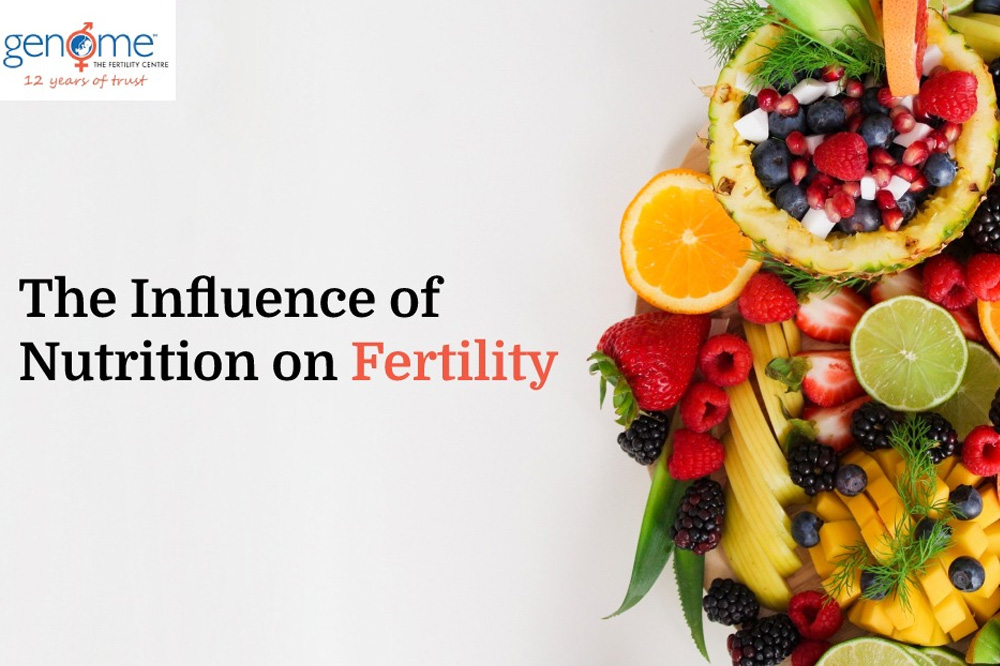The Influence of Nutrition on Fertility
In recent times, medical research has noticed the roles of dietary patterns in impacting fertility for both, men and women.
After all, who knew that your food choices can impact the possibility of parenthood?
Certain food items are believed to strengthen reproductive efforts, support the health of a man’s sperm and woman’s eggs and give vital nutrients for hormonal production and balance.
Likewise, couples who consume an unhealthy diet and are obese have a higher chance of infertility.
While present evidence on the role of dairy, alcohol, and caffeine is unreliable, saturated fats and sugar have been related to inferior fertility outcomes in men and women.
Hence, for couples trying to conceive, consuming the right nutrition is the first logical step.

Fertility and diet
Various researches have shown the positive effects of the following vitamins and nutrients on fertility.
- Folic acid
- Vitamin B12
- Omega-3 fatty acids
- Healthy diets (such as the Mediterranean diet)
Studies have found that semen quality develops with nutritious diets. Whereas, the opposite has been relatedto diets high in saturated or trans-fat.
Significantly, semen quality is not a perfect predictor of fertility, and most studies did not actually examine the impact of paternal diet on the rate of successful pregnancies.
For couples gettingsupported reproductive technologies, women are potentially to conceive with folic acid supplements or a diet rich in flavones (plant-based oestrogens with antioxidant activity).
On the other hand, male fertility may be aided by antioxidants.
In the meantime...
Until we know more, the best possible take from here is to consume a healthy diet if you are a couple trying to conceive.
Doctors also recommend the following to maximize the chances of a healthy pregnancy:
Consume a big breakfast:
Having a substantial breakfast every morning can assist women in their fertility issues.
Especially in the case of PCOS (Polycystic Ovary Syndrome), whose hormonal effects can get reduced with a hefty breakfast.
Although, it is critical to note that increasing the size of your breakfast without decreasing the size of your evening meal can possibly contribute to weight gain.
Consume foods rich in antioxidants:
Antioxidants such as folate or zinc are found to boost fertility in men and women. They deactivate the free extremists and prevent sperm and eggs from getting damaged.
Food items like fruits, vegetables, nuts, grains are full of valuable antioxidants like vitamins C and E, lutein, folate, beta carotene, etc. Consuming these products in good quantity can help a lot in the effort to conceive.
Reduce trans fats:
Trans fats are related to an increased danger of ovulatory infertility, because of their negative effects on insulin sensitivity.
Trans fats are generally present in hydrogenated vegetable oils and some margarine, processed foods, fried foods, and baked foods.
Researches have shown that a diet higher in trans fats and lower in unsaturated fats is linked with infertility for both men and women.
Consume more fibre:
Fibre is critical to get your body rid of excess hormones and maintain your blood sugar levels. Specific types of fibre can reduce excess oestrogen by binding to it in the intestines. The extra oestrogen is then thrown out of the body as a waste product.
Soluble fibre such as sweet potatoes, oats, avocadoes, fruits, etc. is associated with lower levels of progesterone and oestrogen.
Although it is advisable to consult with your doctor on your current fibre intake to check whether you should increase the fibre levels or not.
Eat less refined carbs:
It is not just the amount, but the type of carbs. Refined carbs are extremely problematic.
Refined carbs incorporate sugary food, drinks, and processed grainssuch as white pasta, rice, and bread.
These carbs skyrocket blood sugar and insulin levels as they get absorbed quickly. Refined carbs also showcase highglycemic levels (GI). This GI is used to assure whether a carbohydrate-dense food will boost your blood sugar considerably.
Switchprotein sources:
Swapping animal proteins like meat, fish, and eggs with plant ones can help to reduce infertility significantly.
Hence, reflecton exchanging some of the proteins in your diet with protein from vegetables, lentils, beans, nuts, and low mercury fish.
Cut down your caffeine intake:
The relation between high caffeine intake and fertility isn’t quite certain.
Despite it, you must consider limiting your caffeine intake to maximum of one or two cups per day to stay on the safe side.
Go active:
Exercise can reap many benefits, one of them being improved fertility. Augmenting physical activities have productive effects on both men and women, especially those with obesity.
However, excessive exercise might change the energy balance in your body, and impact your reproductive system negatively.
If you plan to increase your exercise, then do it gradually and consistently.
Final words
A healthy diet is crucial for a healthy body and reproductive system and can improve your chances to become a parent.
Consuming a nutritious diet and making constructive lifestyle changes can enhance fertility and prepare your body for pregnancy.
At the same time, don’t let anxiety get you down. Consult your healthcare provider to find the best choices for you and your partner.